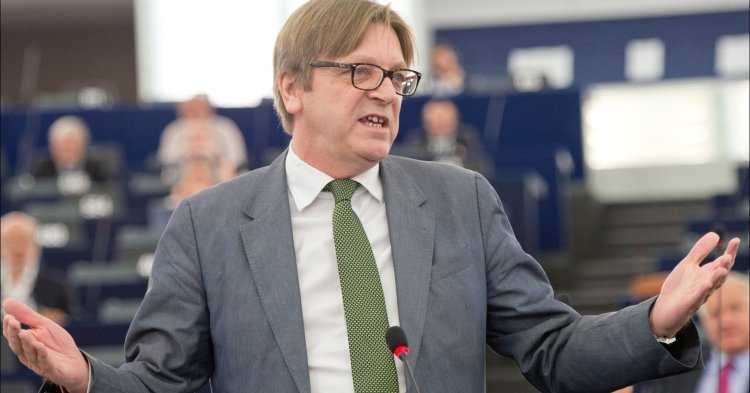None of the above (unfortunately): on Sunday, January 8th, a surprise vote was called on Beppe Grillo’s blog, launching an internal consultation on whether or not the 5 Star Movement should join the ALDE Group in the European Parliament (other two options being to stay in the EFDD Group with UKIP, and moving out of any political group). By the time the internal vote of the 5SM had ended Monday afternoon, there were a number of ALDE MEPs – led by Sylvie Goulard – pacing up and down against a decision they felt wasn’t handled in the most democratic way within the ALDE Group. But who had negotiated for the two political factions?
For ALDE the negotiator was none other than Guy Verhofstadt, the Group President, EP Presidential hopeful and federalist-star-in-chief. For 5SM the negotiator was David Borrelli, part of the “moderate” faction of the Five Star Movement, who was operating with the approval of the Movement’s leadership. The internal 5SM vote resulted in a striking majority for joining the ALDE Group (78,5% of online voters); unfortunately, Verhofstadt withdrew the deal in the evening, on the grounds that there were not “enough guarantees to push forward a common agenda to reform Europe”. In just over 24 hours, Grillo and Verhofstadt managed to completely upset the Parliament’s political scene, and end up more or less exactly where they had begun.
And this is where the surrealism starts.
First of all, some elected members - including MEPs - of the 5SM seemed to be taken completely by surprise by the vote (and some even by the fact that a discussion on the matter being voted upon had been taking place), despite the discussion having reportedly started some months ago already. The two undercurrents of the Movement started publicly bickering about it: the “moderates” supporting Grillo as a master political strategist, the “radicals” stopping just before outright questioning the legitimacy of the whole process.
Secondly, ALDE MEPs seemed to be completely unaware of the fact that such a deal was in the making, too, with Sylvie Goulard – a leading French liberal MEP – voicing her disagreement publicly and loudly, then followed by quite a few national delegations (Danes, Swedes, Lithuanians, etc.). Third, no one was clear until some time on Monday on quite how far these negotiations had gone: was it just an agreement in principle, or were there already technical details of a formal alliance? Specific plans on how Committees’ presidencies and EP funding would be assigned to the factions indicated it was more of a done deal. Or so thought Borrelli and Verhofstadt.
Why are these negotiations relevant for us federalists?
The first set of reasons, as correctly pointed out by Andrew Duff and others on Twitter, explains how they could have been quite the good news for their effects on European political debate and party politics. It would have been good news for the 5SM, which would have signalled a readiness to move into mainstream politics, and thus increased its respectability towards voters, despite the tragic track record of its local administration experiences in Italy. Good news for Verhofstadt and ALDE: they’d have pulled off the first deal of the kind, would have become the third Group in the Parliament and would have thus greatly increased their clout within and without the Parliament. Good news for all pro-European forces: on the off chance that 5SM and its voters would turn pro-euro (highly unlikely, but nonetheless possible), we would have been reaping the benefits of a less confrontational, Eurosceptic discourse coming from the 5SM.
These negotiations were also relevant, however, because of the Verhofstadt persona. Most federalists woke up in dismay on Sunday when they realised their idol, the Master of Ceremony for passionate and vocal federalism in the Chamber, the DJ of pro-EU integration soundbites, was just like every other career politician: ready to come to terms with a loose alliance with whichever partner in order to increase its political influence. These federalists questioned whether there would be any common political vision between ALDE and the 5SM. These federalists were adamant that ALDE, such a pro-European federalist group, could not accept within its ranks a political movement which wants to hold a referendum on the Euro…to get out of it!
The truth is, these federalists and EU commentators have a short-term memory and forget that this is the same Guy Verhofstadt who – in 2014 – was ready to make a deal with the Flemish nationalists of the N-VA, that are pro-European only insofar as EU integration renders Belgium useless as a unitary State and thus paves the way for Flanders’ independence (something that Verhofstadt’s national party, VLD, opposes).
These federalists make the mistake of conflating Guy Verhofstadt and the ALDE Group as one, when the two are quite different things. ALDE MEPs are letting Verhofstadt do his own theatrical show in the EP Plenary every month because this makes them relevant as a Group, but he definitely does not represent the current EU position of the Scandinavian liberals, the British LibDems, the Dutch of the VVD or the Czechs of ANO 2011 as much as he used to.
This was a marriage of convenience for both ALDE and the 5SM, and it should have been clear from the beginning. It showed that Grillo still commands a majority within his movement (whether he commands it in a democratic fashion is beside the point). Opposition to Verhofstadt’s leadership within the ALDE Group, on the other hand, is growing restless and has shown it Monday when it refused the deal the liberal leader had personally designed. His slim chances of becoming Parliament President are now gone: he lost the support of the 5SM, his party doesn’t follow him (it’s not the first time, but this time it happened publicly), and the two major groups in the EP have strong Italian factions that will not let this marriage attempt pass just like that.
It’s a mistake to think this was ever an issue of common values, when it was in fact a test of internal ALDE leadership that Verhofstadt failed. ALDE is not the beacon of federalism that is often portrayed, and Verhofstadt is a general without an army. The only reason ALDE is consistently perceived as more pro-EU is because the EU has been degraded as a project for an advanced free-market area, when it should, in fact, be much more than that.
It should be noted that the author is a federalist and also a member of the Democratic Party, an Italian member of the Party of European Socialists.


Follow the comments: |
|
